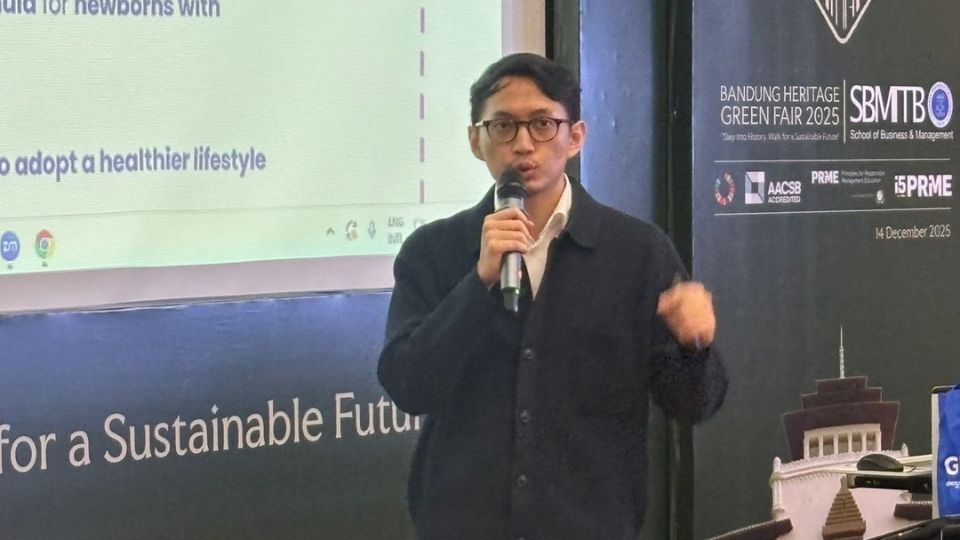The Integrating Business Experience (IBE) course featured Ramadhan Satrio Nugroho, Co-founder of Gently and a member of Forbes 30 Under 30 Asia. Ramadhan shared his journey and the strategies that led to the success of his personal care brand for children, which is now well recognized in the Indonesian market. He provided students with valuable insights into the entire startup process, including how to create an attractive pitch deck for investors, build a product through a minimum viable product (MVP), and achieve product-market fit.
According to Ramadhan, a pitch deck is more than just a set of slides; it serves as a communication tool that can attract investors through logic, data, and a compelling narrative. With his pitch deck, Ramadhan successfully secured IDR 300 million in funding in the first year. He emphasized that a pitch deck reflects a founder’s ability to understand market problems and opportunities, rather than simply being a presentation.
The idea for Gently arose from his personal experience with his wife in 2021. While searching for baby care products for their child, he realized how difficult it was to find products with safe ingredients, good quality, and affordable prices.
“Foreign products are often expensive, and over-the-counter options frequently contain harsh ingredients like SLS (sodium lauryl sulfate),” he explained.
Recognizing this gap, the idea emerged to create a local product that would be gentle, safe, research-based, and accessible to young families in Indonesia.
Ramadhan recognized that a common mistake many entrepreneurs make is seeking a solution first and then trying to find a problem that their idea can address. This approach is backward. We should first identify the actual problem before looking for a solution that effectively resolves it.
Ramadhan explained that the key step in building a business starts with identifying the problem. Only then does he find the solution. The next steps are to calculate market size, identify competition, and highlight your uniqueness.
Unlike many other local brands, Gently produces all of its products in-house. The company invests heavily in R&D facilities to ensure the quality of ingredients and the safety of formulations.
“By having our own facilities, we don’t rely on external factories. This gives us bargaining power and protects our intellectual property.”
Ramadhan emphasized that businesses like this will be more trusted by investors because they have technological assets, research, and a clear development direction.
Ramadhan highlighted five key points that founders should understand before seeking funding. First, the fit of the founder is crucial, as early-stage investors often prioritize the founders over financial metrics. Second, it’s important to include company growth data, even if it’s modest. Third, provide benchmarking proof by including examples of similar successful brands from other countries to help investors see the potential for success.
“In the eyes of investors, business is a beauty contest. So, make sure you know why your business deserves to win.”
After learning how to put together a pitch deck for investors, Ramadhan emphasized the importance of determining whether the product idea is truly needed by the market. The concept is called MVP, or a product that can be tested directly with users quickly and cheaply.
The four main goals of creating an MVP are to validate whether the idea truly solves a problem; observe real user behavior, not just opinions; gather early feedback to improve the product; and avoid wasting time and money creating a product the market doesn’t need.
In Gently’s case, they created 30–50 product samples and distributed them to potential users (young mothers). Based on feedback, gently adjust the texture, aroma, and formula until it truly meets market expectations.
The MVP isn’t the end, but rather the beginning of a learning process. According to Ramadhan, every new market discovery must be retested.
“Keep repeating the process until you find the perfect product-market combination.”
Ramadhan also touched on a common risk in manufacturing: many factories lower the quality of ingredients without the brand’s knowledge. Therefore, he advises new entrepreneurs to have clear legal contracts and certification audits for production partners.
“Make sure all agreements are in writing, even if you’re a small business.”
Furthermore, the most crucial stage in a startup’s journey is Product-Market Fit (PMF), the point at which the product is truly loved by the market and is purchased repeatedly. PMF is achieved when three elements intersect: visibility, where the product truly solves a real problem; desirability, where there is a large market that wants the solution; and feasibility, where the business is able to produce and sell sustainably.
For example, one of Gently’s products did not show any results for six months. However, everything changed when a user’s mother posted a testimonial on social media. The video went viral, and sales skyrocketed from 150 to 5,000 units per month, which even resulted in a two-week out-of-stock situation.
“It wasn’t just luck; it was the outcome of careful experimentation, thorough validation, and effective communication.”
Ramadhan also emphasized the importance of data-driven decision-making. Some of the PMF indicators he used included e-commerce ratings, customer retention, social media engagement, and cohort analysis to see whether existing customers were repeat buyers.
After achieving PMF, Gently began scaling up through strategies like online-first marketing on TikTok and Instagram; collaborations with major influencers like Tasya Farasya; affiliate marketing with thousands of micro-influencers; and community building to strengthen customer loyalty.
“Discover a hero product that can serve as the foundation of your business. A single strong product can propel a brand to reach hundreds of billions in value”.
From this guest lecture, SBM ITB students learned that building a startup isn’t about a brilliant idea, but about understanding the problem, testing solutions, and telling a story with compelling data.





